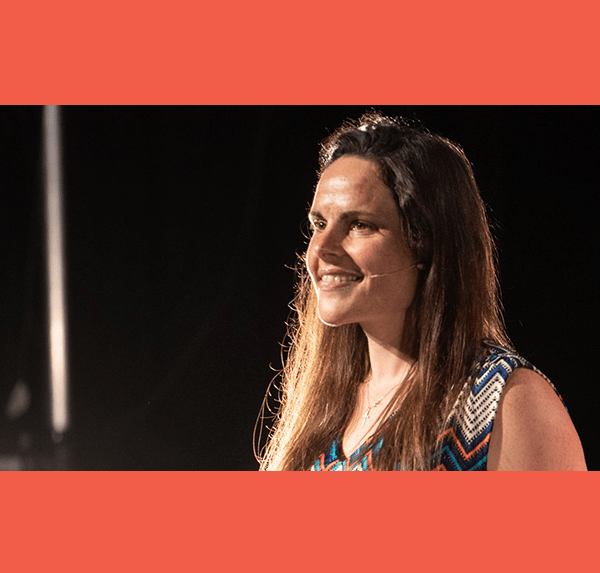Aurelie Litynski, founder of Happitude at Work, has been trained by leading global experts on the topics of positive psychology, positive neuroplasticity and happiness in the workplace.
As Chief Happiness Officer, Aurelie draws on her extensive training and active engagement in the field to create workshops, programs and public events that tackle topics such as workplace behaviour, communication, empathy and trust.


She was inspired to start learning about happiness in the workplace when she noticed the ways in which her own frustrations were impacting her motivation, performance, and her personal life in her previous role. Today, she supports SMEs, multinational organizations and corporate leaders with boosting their productivity at work through teaching them how to think more positively.
And as part of our Crafting Your Future series of events, she spoke to a virtual audience of EU students and international business leaders about the importance of creating a positive work environment, on an individual, team, and organizational level.
Keep reading, if you missed it, to find out how you can boost your positivity and take action to drive happiness in your work life/place.
Happiness vs. engagement
In Aurelie’s experience, leaders in business don’t like to talk about “happiness” at work. They’d rather speak about “engagement”, because it sounds more professional. However, “happiness” and “engagement” do not mean the same thing. Neither are they mutually inclusive. We can be engaged at work and still not be happy, which can be bad for both employees and their bosses long term. A joint study by the Universities of Zurich and Leipzig showed that 50% of all highly engaged employees exhibit strong symptoms of burnout and are very likely to leave their organization, which means the company faces higher rates of staff turnover.
Our take away is: don’t exclude happiness from the conversation. By creating a safe environment where the team’s happiness is a priority, you will see engagement levels go up in a more sustainable way.


Why is the topic of happiness at work so important?
The topic of happiness at work is by no means a new one. 20 years’ scientific research has been done on the subject. However, since the pandemic, it’s become clear that we are heading towards a new way of working. And this new, largely remote setup proves how important it is to have people around us that we trust. Creating an inclusive environment that centers around the happiness of your team will help forge a bond of trust that goes both ways.
The other big thing we’re all talking about at the moment, as a result of 2 years of isolation and lockdowns, is mental health. Generally speaking, people are more focused on their mental wellbeing outside of work. But it’s equally important for us to take care of our mental health in the workplace, because we spend so much time there.
Furthermore, there’s a positive correlation between good mental health and work performance. Often, we think that to be more productive and more motivated, we need all the extras. Bonuses, work perks, office spaces with games rooms etc. But, as Daniel T. Gilbert and Timothy D. Wilson from the University of Virginia put it, “Most of the things we think make us happy don’t make us as happy as we think.”


From that, we can learn, happiness at work isn’t about what we do or what we get for our job, it’s how we feel about it. In other words, it’s emotional, not rational. And that’s why this is such an important topic, because it’s those positive emotions that are going to drive productivity, motivation, creativity, and innovation in the workplace, not material gains.
Ideas to boost positivity
Unfortunately, as humans, we have a tendency to put our negative emotions first. This is called our “Negativity Bias”, and it’s an unconscious, primal instinct, that stems from the amygdala in our brains. However, Aurelie is a firm believer in the fact that happiness is a skill that can be learned, and that there are many benefits to having a more positive mindset.
For example, according to Shawn Achor, author of, The Happy Secret to Better Work, our brain is 31% more productive when we have a positive attitude. Our head is clearer, we’re more focused, more creative, happier, we’ve got more energy, and ultimately, we’re more successful.
So, what are some of the ways we can retrain our brain, to help us focus on our positive emotions?
1. Reflect on the highlights of your day/week.
At the end of the day, or the beginning of a weekly call with your team, reflect on what went well for you today, what made you happy, or what you are grateful for. Aurelie does this twice a day, once sitting at her desk, straight after she’s finished work, and then again with her children at bedtime.
2. Deliver recognition and praise.
The words of others can have a huge impact on how we feel. Equally, the things we say can have an effect on other people’s emotions. To boost positivity in the workplace, think about saying a heartfelt thank you to someone, or sending a positive message. And bosses, you can drive recognition by acknowledging the hard work your team does at the beginning of a meeting. This will not only boost positivity in the room, but also creativity and efficiency, as a result.


How to take action
If you want to create a safe environment at work, where people can share their feelings, feel like they’re part of a team, and trust one another, there are two main drivers you need to focus on:
1. Feelings of achievement
- Receiving recognition, feeling appreciated
- Making a difference at work
- Seeing your personal development, tracking your learning curve
- Understanding the purpose of your job and knowing your role is important
Aurelie’s top tips for boosting our feelings of achievement at work include celebrating our successes, no matter how small, and prioritizing our time effectively using the “time boxing” method.
2. Relationships at work
- Sense of belonging
- Getting along with your colleagues
- Having a good relationship with your manager
- Communicating openly and honestly
- Showing gratitude, empathy, and kindness
- Trust
- Having fun together
The best ways to boost your relationships at work are to schedule regular check-ins. Or, as Aurelie calls them, “happiness talks”. This is to emphasize their purpose, which is to boost positivity and build better relationships. Another great way to improve your relationships at work can be to share your knowledge with your colleagues, e.g. through a mentoring scheme.
Keep the conversation going
Engagement and productivity are a result of our happiness at work – not the other way around. The more we acknowledge and talk about this, the more widespread positive workplace cultures will be. To stay in touch, and for more strategies on how you can make yourself happier at work, follow Aurelie on LinkedIn at Aurelie Litynski.










